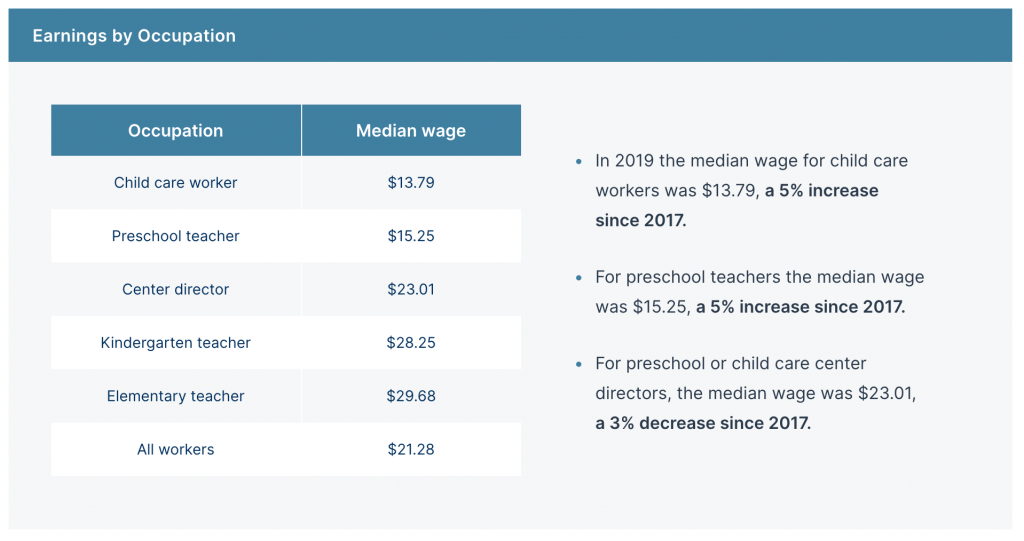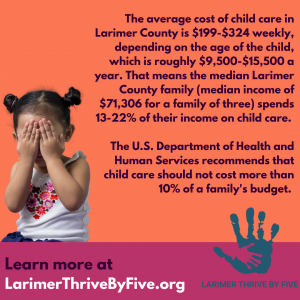Our kids–and early childhood educators–are suffering because of it: An Op-Ed from ECCLC CEO Christina Taylor
I couldn’t sleep last night. Not because of something going on with my kids, but rather because of the current situation with all of our kids–infants, toddlers, and preschoolers right in our community. I’m fed up and fired up, and you should be, too.
Let me first paint the picture for you.
I can often make the mistake of thinking that everyone understands the importance of early childhood, particularly the first 5 years of a child’s life. What many do not know is that a child’s brain develops in the first five years at a pace that is unmatched at any other point. They form millions of neural connections in their brain every second, which creates the pathways on which they will rely for their overall cognition, mental well-being, and social skills for the rest of their life. The caregivers that interact with our children in their first five years, from parents, grandparents and babysitters, to early educators such as child care providers, are the basis for that early growth and development. Numerous studies have shown just how critical it is for our children to have high quality early experiences to ensure they are able to be successful and thrive from day one. Not only that, but children need consistency. Any of you who have raised children yourself understand that they thrive on consistency and routine. That too is backed up in research.
I sat in a meeting with a child care center director last week, and was moved to tears at her account of the state of child care today. Her teachers are struggling to pay basic bills. She cannot keep teachers in her center to maintain continuity of care for children, and is worried about closing additional classrooms due to lack of teachers. She said to me “this is the saddest I have ever been in my life. I cry before I go to work, and I cry when I get home.” Her center started a ‘Giving Tree’ program for the holidays, where anyone in need can put a card on the tree to ask for support. She broke into tears as she told me that the majority of the cards on the tree were not external families, but early childhood teachers that couldn’t afford their basic needs. This isn’t an issue that is limited to her center. This issue is widespread, and these are the very professionals we all rely on to support our next generation, our community, our economy, and our workforce.
Imagine for a moment an early childhood classroom full of toddlers– little humans who are seeking acknowledgement and connection, love and understanding. They want you to see that they got the circle peg successfully in the circle hole. That they kept trying, and like you taught them, eventually got it. They need to be seen. In that same classroom, imagine their teacher. This is an individual with years of education and experience. Someone who not only understands how your child’s brain develops, but what strategies they need to employ in a classroom to maximize that growth. They know how to watch your child’s behavior to determine when they need a little extra attention to ensure their social and emotional development stays on track.
But, in any given quiet moment in a classroom (I admit, there aren’t many), that teacher, with all their education, expertise and love, will often be thinking of how to feed their own children. Of how to get their eldest to a doctor without health insurance, as that cough just won’t go away. They might sit and stress over the behavior they witnessed in their youngest just that morning, and know based on their expertise that their kiddo needs additional support, like speech or occupational therapy. But they couldn’t possibly afford it. And the toddler in the classroom that is seeking their acknowledgement, that needs to be seen for their efforts and their success to develop that habit of perseverance, might not get it. Worse still, that toddler might have a totally new teacher in their classroom the next week due to turnover, and will have to start from scratch in building that trusting relationship.
Early childhood educators are doing their absolute best, and this is not to disparage their lack of concentration and attention. Instead, this is a hypothetical meant to highlight their humanity. The very real situation they are put in every day–their job is to attend to the educational needs and growth of the children they are responsible for, often at the expense of their own wellbeing and mental health, and that of their own children and family. Our future lies in the successful growth and development of those little minds, yet how we treat and compensate early educators shows that we are not giving it our best.
Early educators (often called child care providers) make an average of $13-$15 an hour. The poverty rate for early educators in Colorado is 15.1 percent! According to the Massachusetts Institute of Technology (MIT), a single parent of two children needs to make $42/hr to afford to live in Larimer County. A two-parent household with BOTH parents working (and 2 children in the home) each need a minimum of $23/hour to afford to live in Larimer County. This equates to a basic self sufficiency wage- what is needed to afford housing, food and basic necessities. So why is this? Why aren’t child care centers, some of which are corporate-run programs with offices headquartered in places like New York and Chicago, paying their educators more?

The reason is rooted in the child care sector as a whole. Revenue in a child care program primarily comes in one form: parent fees and tuition. The amount a family pays, per child, for early care and education is what supports the operating costs of a child care program. So a family with two children, paying a hypothetical figure of $200/week per child, is contributing $1600 of revenue to that program per month. A program that can house, say, 100 children, is then bringing in $160,000 a month to the child care center. Whoa, that seems like a lot of money, right? But wait–we are not considering the rules and regulations that guide child care. The state sets a minimum number of teachers and aides per classroom based on age, to ensure quality and safety. Then there are administrative staff, maintenance and cleaning (imagine how much cleaning is needed with hundreds of children under 5!), cooks, etc. You also have to pay for the building itself, maintain the cost of materials and toys, keep the outdoor play area up to code and safe for children, etc. That $160k a month doesn’t cover all of that for a center, let alone a living wage for the educators and other staff they employ.
The only way to raise revenue is to increase family tuition rates. Therein lies the rub. If programs
At the federal level, there is an understanding of this issue that I find promising. Biden’s Build Back Better plan includes a provision that would “raise payment rates to meet the cost of care, including, at a minimum, providing a living wage and establishing wages equivalent to elementary educators with equivalent credentials”. If the bill passes the Senate, this could have an enormous benefit on the child care sector, and would take steps to fix what many refer to as a broken market.
Locally, Colorado has a lot going on in the early childhood realm. The State is currently developing a cabinet-level department for early childhood. Universal pre-k for all Colorado 4-years olds is on the way after the passage of House Bill 20-1304 last year. Millions of dollars in federal COVID relief funding is being temporarily poured into the sector to support the early childhood workforce. State plans are taking big strides to do things differently with each of these opportunities–to challenge the status quo and shake up a broken sector. But more is needed. For example, there are points in Colorado’s draft universal pre-k plan released just last week that refer to ensuring that reimbursement rates for universal pre-k are comparable to the current rates paid to the provider for the Colorado Preschool Program, rather than a push to increase those rates across the board from day one.
We cannot continue to compensate those responsible for the growth and positive development of our youngest citizens so poorly. A December 2021 local job posting for a retail stocking and unloading position pays $13-$20/hour with benefits, quarterly incentives, and premiums of $0.35-$3.00/hour (for schedule, holidays, etc.). There’s no world in which it makes sense for someone who handles canned goods to make more than someone who cares for and educates our children.
So what can we do about this today? Here are a few suggestions:
- Consider making a tax-deductible donation to Early Childhood Council of Larimer County or one of these Larimer County non-profit organizations dedicated to early childhood care and education.
- Get behind Larimer Thrive by Five and help ensure others understand the importance of investing in quality early childhood care and education. Learn more here.
- Support future efforts to bring sustainable funding for early childhood care and education to Larimer County. Email [email protected] with your interests and contact information, and we’ll keep you posted about upcoming opportunities.